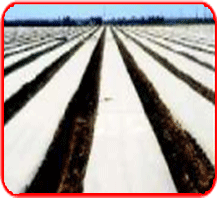Soil Solarisation is normally done during summer months with
temperature (air) more than 35°C for controlling weeds,
seeds, bacteria, fungi, nematodes and other soil borne
pathogens and pests by covering the moist soil with a transparent
polyethylene film exposed to sunlight. The effectiveness of soil
solarisation enhances plant growth by improving soil colour,
structure, temperature, moisture etc.
Advantages
- Controls weed, nematodes and other soil borne diseases.
- Enhances germination and helps in the development of
healthy seedlings.
- Enhances plant growth and yield.
- Helps in reducing usage of weedicides / herbicides.
Factors effecting Soil Solarisation:
- Soil moisture
- Day length
- Temperature.
- Intensity of sunlight.
Suggested polyethylene film for soil solarisation:
- 25 micron transparent Polyethylene film
Physical identification of successful solarisation:
- Water droplets collected in the inner surface of the film.
- The upper surface of the will be very hot.
- Weeds under the film will be eliminated due to high temperature.

